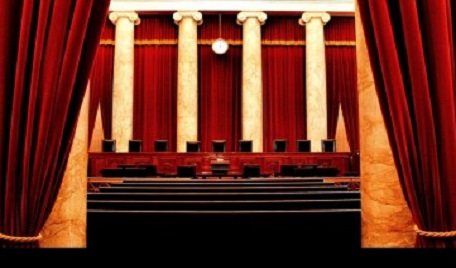Recent summers in the U.S. Supreme Court have been deceptively quiet. It is still true that when the final decision is issued in late June or early July, the building itself seems to emit a sigh of relief, and peace appears to reign throughout the carpeted halls separating the justices’ chambers.
 But as the current summer takes its final bows, the justices continue to face a nearly unprecedented slew of emergency applications in which states, organizations, individuals, and the Biden Administration urge the high court to intervene in lower court litigation.
But as the current summer takes its final bows, the justices continue to face a nearly unprecedented slew of emergency applications in which states, organizations, individuals, and the Biden Administration urge the high court to intervene in lower court litigation.
And the applications, which claim imminent injury if the justices don’t act, are more reflective of the issues dividing Americans today than they have been in the past.
On August 28, 2024, the justices “hit a rare (and perhaps first-ever) milestone: *100* decisions by the full Court on emergency applications in a single term,” wrote Georgetown University Law Center Prof. Stephen Vladeck on the social media platform, X.
Vladeck has done more than anyone to illuminate the Court’s handling of these often nationally significant applications. They comprise what has become known as the “shadow docket.” Vladeck is the author of “The Shadow Docket: How the Supreme Court Uses Stealth Rulings to Amass Power and Undermine the Republic.”
Critics of the shadow docket contend that the Court’s decisions on these applications often make law and do so without the normal process of granting review, full briefing, and oral arguments, and the decisions often issue with no explanation and no disclosure of how justices voted.
On the day that the justices reached that 100 decisions milestone, a majority agreed to keep lower court injunctions temporarily blocking the Biden Administration’s student loan repayment program (SAVE). No sooner did those decisions come out than two additional and different emergency applications were filed.
On average, the justices have had about 23 emergency applications pending at one time throughout the summer. In a recent public appearance, Justice Sonia Sotomayor noted, “There used to be a time when we had a good chunk of a summer break. Not anymore. The emergency calendar is busy almost on a weekly basis.”
These applications, in addition to the two student loan filings, have included:
- Two involving challenges to the U.S. Department of Education’s Title IX rules barring discrimination against transgender students;
- Oklahoma’s challenge to a federal rule requiring abortion referrals by states receiving Title X funds;
- Another Oklahoma application asking the justices to set aside the Environmental Protection Agency’s methane rule;
- Eight applications by coal states, utilities and others challenging EPA’s greenhouse gas power plant emissions rule;
- Seven applications challenging EPA’s mercury and air toxic standards;
- Telecommunications organizations challenging New York’s enforcement of its broadband rate regulation.
A regular staple of the shadow docket are applications for stays of execution. The justices appear to have little interest in the issues that are being filed. The death row inmate’s request is rarely granted.
There are also applications with little national significance, for example, requests for bail while appeals are pending, and relief from deportations.
And not all the justices are happy with how the Court is responding to the influx of emergency applications.
Justice Ketanji Brown Jackson wrote in an opinion last term: “This Court is not compelled to rise and respond every time an applicant rushes to us with an alleged emergency, and it is especially important for us to refrain from doing so in novel, highly charged, and unsettled circumstances.”
What has been missing so far from the shadow docket this year are election-related emergency applications. The justices disposed of just one– from Arizona– earlier. But based on what the nation witnessed after the 2020 presidential election, that gap may be filled with a vengeance depending on how voting proceeds in the states and what the outcome of the 2024 election brings.
In an interview on CBS, Justice Jackson was prepared for what the election may bring to the Supreme Court. She answered that she was “prepared as anyone can be.”
Marcia Coyle is a regular contributor to Constitution Daily and PBS NewsHour. She was the Chief Washington Correspondent for The National Law Journal, covering the Supreme Court for more than 30 years.







